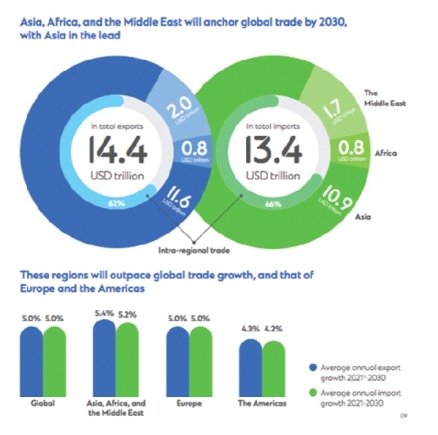
High dependence on commodity trade challenge to AfCFTA — Stanchart report
A REPORT by the Standard Chartered Bank has indicated that Africa’s high dependence on commodity trade is a challenge to reaping the full benefits of the African Continental Free Trade Area (AfCFTA) agreement.
The report noted that while headline growth in Africa’s exports has been robust at 7.7% per annum over the past two decades, it remains commodity-heavy. According to a recent United Nations Conference on Trade and Development (UNCTAD) study, 45 markets in the region are considered to be commodity-dependent, with commodities accounting for 90.1% of their goods.
The report said these markets have very low diversification, noting that in 18 African markets, only one product accounts for more than half of their total exports.
As a result, these markets are disproportionately exposed to global price volatility and lose out on opportunities for local value-addition. Intra-Africa trade stagnates.
The report also highlighted that in the past two decades, Africa’s intra-regional tared fell by one percentage point.
This means that Africa lags behind other regions such as Asia where policies that incentivise industrialisation, export growth and regional integration have transformed economies and enabled increased participation in global value chains.
“The AFCFTA has a critical role to play in unlocking similar success and intra-regional growth in Africa, but several challenges must be addressed in parallel,” the report noted. Other challenges that were highlighted in the report are regulation-based challenges; infrastructure inadequacies and trust and governance issues.
Digital solutions
The report further indicated that digital supply chain finance solutions could be a game changer in the implementation of AfCFTA.It said such digital solutions would help improve access to finance and allow businesses to expand and take full advantage of the agreement.
It also highlighted that digital solutions would help smaller suppliers access cost-effective working capital financing, help boost trade volumes and enable more sustainable and inclusive supply chains.
The report, titled “The Future of Trade Africa; Spotlight on the AfCFTA” said these digital solutions could boost exports in five key African economies by $34 billion, 9% over the baseline. It further indicated that e-commerce could increase market access, with almost three-quarters of business leaders expecting at least 20 per cent of their sales to come through e-commerce channels in the next two to three years.
In-depth research
Speaking at the launch of the report, the Chief Executive Officer of the Standard Chartered Bank Ghana PLC, Mansa Nettey, said the was designed based on in-depth research, a survey of business leaders across the continent, expert analyses on key policies and major opportunities.
She said the report sought to establish a clear perspective on enabling African economies to develop a solid manufacturing sector, while avoiding the commodity trap through value chain formation and value addition for the local, regional and global export markets.
She said the new report was a good reference because it laid out key recommendations for navigating the challenges associated with the single market initiative.
Ms Nettey added that rising regional trade levels and greater connectivity would unlock high-growth corridors across Africa and beyond.
“Rising regional trade levels and greater connectivity would unlock high growth corridors on the continent with intra-East Africa growing by 15.1%; intra-West Africa increasing by 13.2%, and Central Africa rising by 12.9%.
We believe that certain critical measures such as governance, cooperation and investment in cross-border infrastructure development, trade facilitation measures, as well as financial infrastructure must be put in place,” she said.